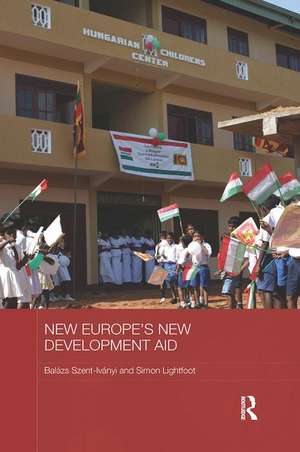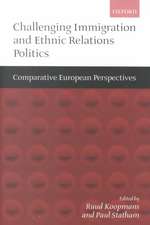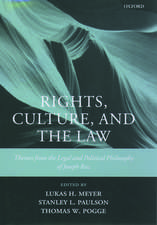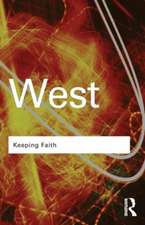New Europe's New Development Aid: BASEES/Routledge Series on Russian and East European Studies
Autor Balázs Szent-Iványi, Simon Lightfooten Limba Engleză Paperback – 10 mai 2017
| Toate formatele și edițiile | Preț | Express |
|---|---|---|
| Paperback (1) | 233.25 lei 43-57 zile | |
| Taylor & Francis – 10 mai 2017 | 233.25 lei 43-57 zile | |
| Hardback (1) | 732.41 lei 43-57 zile | |
| Taylor & Francis – 5 mai 2015 | 732.41 lei 43-57 zile |
Din seria BASEES/Routledge Series on Russian and East European Studies
-
 Preț: 228.19 lei
Preț: 228.19 lei -
 Preț: 311.22 lei
Preț: 311.22 lei - 8%
 Preț: 389.69 lei
Preț: 389.69 lei -
 Preț: 737.43 lei
Preț: 737.43 lei -
 Preț: 309.89 lei
Preț: 309.89 lei -
 Preț: 310.22 lei
Preț: 310.22 lei -
 Preț: 297.39 lei
Preț: 297.39 lei -
 Preț: 326.49 lei
Preț: 326.49 lei -
 Preț: 349.09 lei
Preț: 349.09 lei - 9%
 Preț: 1038.51 lei
Preț: 1038.51 lei - 24%
 Preț: 298.10 lei
Preț: 298.10 lei -
 Preț: 398.18 lei
Preț: 398.18 lei - 18%
 Preț: 1271.75 lei
Preț: 1271.75 lei - 18%
 Preț: 1057.05 lei
Preț: 1057.05 lei - 18%
 Preț: 1059.84 lei
Preț: 1059.84 lei - 18%
 Preț: 1062.26 lei
Preț: 1062.26 lei - 18%
 Preț: 1055.51 lei
Preț: 1055.51 lei - 18%
 Preț: 1057.75 lei
Preț: 1057.75 lei - 18%
 Preț: 1059.84 lei
Preț: 1059.84 lei - 25%
 Preț: 823.63 lei
Preț: 823.63 lei -
 Preț: 487.75 lei
Preț: 487.75 lei - 18%
 Preț: 1005.39 lei
Preț: 1005.39 lei - 18%
 Preț: 1000.76 lei
Preț: 1000.76 lei - 8%
 Preț: 382.79 lei
Preț: 382.79 lei - 18%
 Preț: 1059.84 lei
Preț: 1059.84 lei - 18%
 Preț: 1059.84 lei
Preț: 1059.84 lei - 18%
 Preț: 1009.21 lei
Preț: 1009.21 lei - 18%
 Preț: 1059.84 lei
Preț: 1059.84 lei - 18%
 Preț: 1167.36 lei
Preț: 1167.36 lei - 18%
 Preț: 1060.87 lei
Preț: 1060.87 lei - 30%
 Preț: 771.71 lei
Preț: 771.71 lei - 18%
 Preț: 1059.84 lei
Preț: 1059.84 lei - 18%
 Preț: 1004.20 lei
Preț: 1004.20 lei - 18%
 Preț: 1053.92 lei
Preț: 1053.92 lei - 25%
 Preț: 515.72 lei
Preț: 515.72 lei - 18%
 Preț: 709.01 lei
Preț: 709.01 lei - 25%
 Preț: 823.08 lei
Preț: 823.08 lei - 18%
 Preț: 1103.19 lei
Preț: 1103.19 lei - 18%
 Preț: 1057.75 lei
Preț: 1057.75 lei - 18%
 Preț: 1065.75 lei
Preț: 1065.75 lei - 18%
 Preț: 1055.51 lei
Preț: 1055.51 lei - 26%
 Preț: 850.73 lei
Preț: 850.73 lei - 25%
 Preț: 825.06 lei
Preț: 825.06 lei - 18%
 Preț: 734.50 lei
Preț: 734.50 lei - 26%
 Preț: 821.94 lei
Preț: 821.94 lei - 18%
 Preț: 1062.98 lei
Preț: 1062.98 lei - 18%
 Preț: 1002.63 lei
Preț: 1002.63 lei
Preț: 233.25 lei
Nou
Puncte Express: 350
Preț estimativ în valută:
44.63€ • 46.72$ • 36.93£
44.63€ • 46.72$ • 36.93£
Carte tipărită la comandă
Livrare economică 07-21 aprilie
Preluare comenzi: 021 569.72.76
Specificații
ISBN-13: 9781138079168
ISBN-10: 1138079162
Pagini: 228
Ilustrații: 5
Dimensiuni: 156 x 234 mm
Greutate: 0.34 kg
Ediția:1
Editura: Taylor & Francis
Colecția Routledge
Seria BASEES/Routledge Series on Russian and East European Studies
Locul publicării:Oxford, United Kingdom
ISBN-10: 1138079162
Pagini: 228
Ilustrații: 5
Dimensiuni: 156 x 234 mm
Greutate: 0.34 kg
Ediția:1
Editura: Taylor & Francis
Colecția Routledge
Seria BASEES/Routledge Series on Russian and East European Studies
Locul publicării:Oxford, United Kingdom
Public țintă
PostgraduateCuprins
1. Introduction 2. Theoretical Framework 3. The "Global Consensus" on Foreign Aid 53 4. New development policies in the ECE countries 5. The role of external actors 6. Non-governmental organizations 7. The domestic politics of aid 8. Conclusions
Notă biografică
Balazs Szent-Ivanyi holds a lecturer position at Aston University in Birmingham, and is also an Associate Professor at Corvinus University, Budapest.
Simon Lightfoot is a senior lecturer in European Politics at the University of Leeds, UK
Simon Lightfoot is a senior lecturer in European Politics at the University of Leeds, UK
Recenzii
"The book is thoughtfully organised, well-written and provides relevant material on an important aspect of supranationalism and adaption to international organisations—which is studied almost under in vitro conditions. In addition to the authors’ plea for further research on the stance of CEECs vis-à-vis the issue of policy coherence, it would also be important to expand the geographic scope by including cases such as Estonia, Latvia and Lithuania—countries which were not able to build on previously established frames of development cooperation—and to relate the findings to other studies on (post-accession) Europeanisation in light of the EU’s post-Brexit crisis as a global actor."
STEFAN GÄNZLE, University of Agder, Europe-Asia Studies
STEFAN GÄNZLE, University of Agder, Europe-Asia Studies
Descriere
This book examines the international development policies of five East Central European new EU member states, the Czech Republic, Hungary, Poland, Slovakia and Slovenia. These countries turned from being aid recipients to donors after the turn of the Millennium in the run-up to EU accession. The book explains the post-2004 evolution and current state of foreign aid policies in the region and the reasons why these deviate from many of the internationally agreed best practices in development cooperation. It argues that after the turn of the Millennium, a ‘Global Consensus’ has emerged on how to make foreign aid more effective for development.














